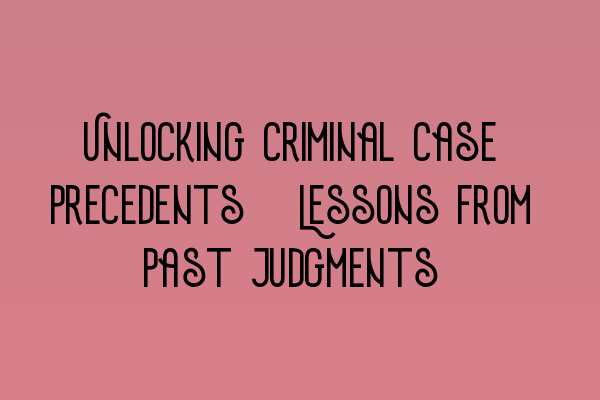Unlocking Criminal Case Precedents: Lessons from Past Judgments
At SQE Criminal Law & Practice Law UK, our team of expert solicitors is dedicated to providing you with the most up-to-date information and insights in the field of criminal law. Today, we will be delving into the world of criminal case precedents and the invaluable lessons they can teach us. By analyzing past judgments, we can gain a deeper understanding of legal principles and enhance our ability to effectively represent our clients.
The Power of Precedents
Precedents play a fundamental role in the common law system, where judicial decisions establish a binding authority for future cases. They provide a solid framework for legal arguments and help ensure consistency in the application of the law. Understanding how past judgments have shaped the legal landscape allows us to navigate complex cases more efficiently and effectively.
One significant aspect of criminal case precedents is their ability to shed light on relevant legal principles. By examining the reasoning employed by judges in previous cases, we can gain insights into how they interpreted statutes, defined legal standards, and evaluated evidence. This knowledge is crucial when crafting persuasive arguments and building a strong defense strategy.
Lessons from Landmark Judgments
Several landmark criminal case precedents have had a profound impact on the development of criminal law in the UK. For instance, the judgment in R v R (1991) transformed the legal landscape surrounding marital rape, recognizing it as a criminal offense. This case serves as a reminder of the evolving nature of criminal law and the importance of staying abreast of recent judgments.
Another notable judgment is R v Brown (1993), which addressed issues related to consensual sadomasochism. The judgment established important principles regarding consent and explored the boundaries of personal autonomy in criminal law. Understanding the nuances of this case is vital for criminal law practitioners involved in cases where consent is a key element.
Keeping Up with Precedents
Staying up to date with criminal case precedents can be a challenging task, as new judgments are delivered regularly. However, our team at SQE Criminal Law & Practice Law UK is dedicated to providing comprehensive SQE 2 preparation courses and SQE 1 preparation courses that cover the latest developments in criminal law.
To ensure you never miss crucial updates, we highly recommend referring to reliable sources such as SRA SQE Exam Dates and legal databases. These platforms offer access to a wealth of information, including case summaries, appellate court decisions, and legal commentaries.
Conclusion
Unlocking criminal case precedents enables us to learn from the past, delve into legal principles, and enhance our ability to serve our clients. By understanding the lessons from landmark judgments like R v R and R v Brown, we can navigate the complexities of criminal law with confidence.
At SQE Criminal Law & Practice Law UK, we are committed to providing the highest quality legal guidance and training. Explore our SQE 1 Practice Exam Questions and SQE 1 Practice Mocks FLK1 FLK2 to further enhance your knowledge and skills in criminal law.
